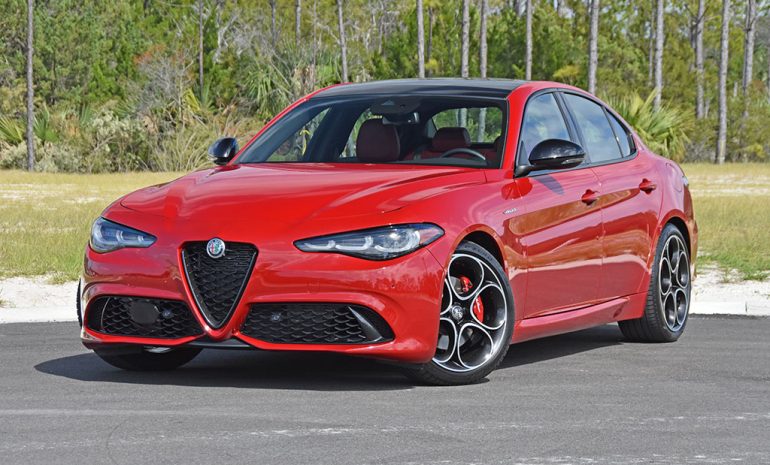
Ever since Alfa Romeo made a return to the States, there’s been a newfound enthusiasm for affordable Italian cars as they are now within reach outside the traditional scopes of brands like Ferrari or even Maserati. Captivating inquiring audiences, the Alfa Romeo Giulia has been a success in bringing a new flare to the compact luxury sedan segment. The Giulia is quite unique in all that is offers for those looking for an entryway into luxury but who want to avoid following the traditional crowd.
For the 2024 model year, the Giulia receives some minor updates, starting with the headlight design now featuring triple LED lighting elements (Trilobe headlights) for the daytime running lights and turn signals. Moreover, the updated Giulia gets a 12.3-inch digital gauge cluster, while the top Quadrifoglio trim now gets a mechanical limited-slip differential out back, replacing the torque-vectoring setup of previous years.
Also, don’t forget that you can get discounted new car pricing with a free quote through qualified local dealer partners.
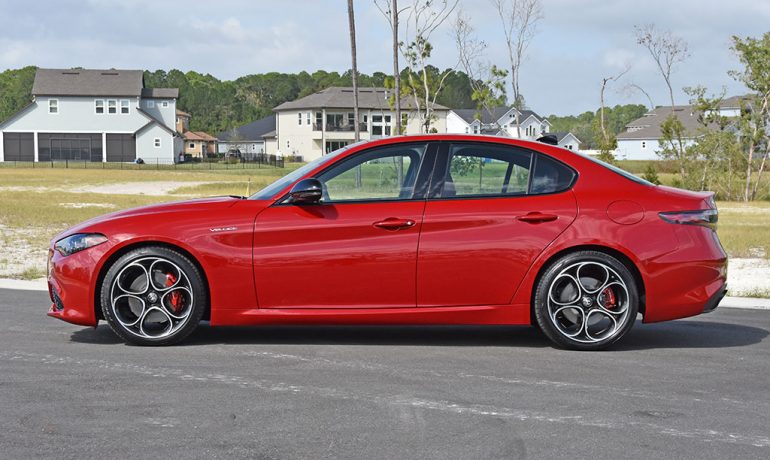
Styling-wise, the Alfa Romeo Giulia remains a standout, in a good way, with its Italian flare. Even more so, the Giulia gets double takes from onlookers when adorned in my test vehicle’s Alfa Rosso exterior paint, having those stylish 19-inch 5-hole aluminum wheels and finishing things off with red brake calipers. The curvaceous sheet metal of the Giulia comes off as attractive, where it nearly looks the part of a 4-door exotic.
Powering the new Alfa Romeo Giulia in its base form is a 2.0-liter turbocharged 4-cylinder engine that makes 280 horsepower and 306 lb-ft of torque mated to an 8-speed automatic transmission. The engine feels refined and full of power throughout the rev range for a 4-cylinder, with a substantial midrange that often mitigates unwanted downshifts. The standard rear-wheel drive (RWD) setup of the Giulia brings a bit of excitement to the base formula, while all-wheel drive remains an option for those who may require use in northern winter weather or want the added assurance of better traction in questionable road conditions.
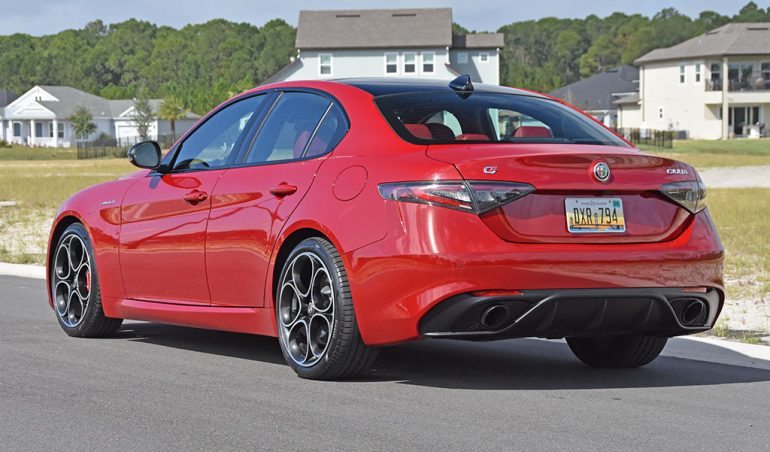
The Giulia with the RWD (Q2) setup in the Veloce trim feels very planted to the road with a welcomed sense of stability. The fixed-rate dampers do well to soak up road imperfections and deliver a nice balance of comfort and sport. Moreover, having a limited-slip differential in the Veloce trim, one of the few important features added over the base Sprint and Ti trims, provides an added edge for when you want to accelerate hard or navigate through somewhat slippery road surfaces.
The drive modes, or DNA (dynamic, natural, and advanced efficiency), have subtle changes to the vehicle’s dynamics, modifying the throttle positioning, steering effort, and shift programming of the 8-speed automatic transmission. Power delivery is strong and mostly on the quiet side, where the refinement of the Giulia Veloce Q2 adds to its luxury appeal. Zero to 60 mph comes in at 5.2 seconds, which is on par for running with competitors for its mid-range trim level. The steering and overall balance of the Giulia is good as well, with a near-perfect 50/50 distribution promoting confidence in navigating back twisty roads, which is partly thanks to its lighter curb weight (just over 3,500 pounds) compared to many competitors, thanks to lightweight components like its standard carbon fiber driveshaft.
One of the surprising aspects of the Alfa Romeo Giulia Veloce Q2 is its fuel consumption, which often bested the EPA figures of 24 mpg city, 33 mpg highway, and 27 mpg combined in the real world. The EPA figures are easily attainable, and you may find that having the rear-wheel drive Giulia Veloce trim that you’ll match or beat the numbers, giving you a driving range of over 500 miles on the highway with a full 15.3-gallon tank of premium unleaded fuel.
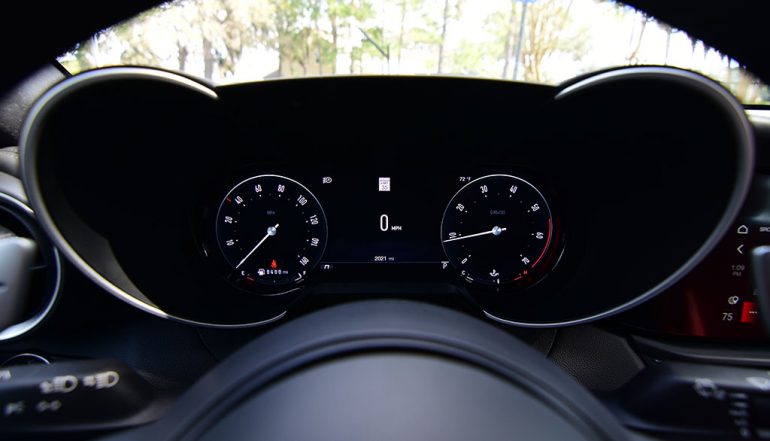
The cabin of the Alfa Romeo Giulia remains mostly unchanged except for the new 12.3-inch digital gauge cluster. Even though the new cluster is a digital unit, there’s not much customization to play with. The smallish 8.8-inch infotainment touchscreen can be a mixed bag most of the time due to its smallish size, somewhat lower resolution, and slow-to-respond inputs. I found that the system isn’t consistent in its operation as some functions decide to take longer to respond than others, which can quickly add to your frustration when you’re driving. There is a welcomed redundancy of controls using the large central knob and its two physical buttons for home and setting functions. Still, the use of the touchscreen or physical knob often led to lagging responses and a long learning curve, even after an over-the-air system update during my time with the Giulia Veloce Q2. The integration of wireless Apple CarPlay and Android Auto seems to mitigate some of the vehicle’s infotainment system slowdowns, where Apple CarPlay linked up to my iPhone 13 Pro seemed to work just fine.
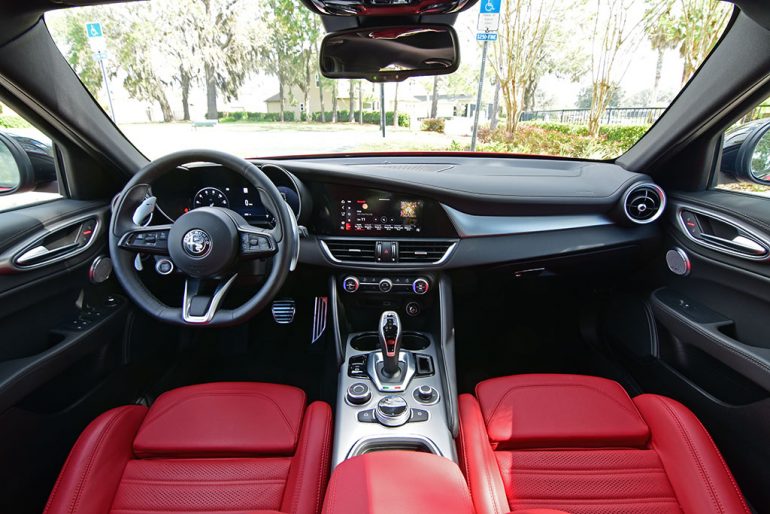
The seating areas of the Giulia are fitting for an Italian luxury sports sedan, with the front heated seats having somewhat aggressive bolstering. However, the seats themselves are accommodating enough to support most body types without being too tight/loose or uncomfortable. The rear seating area has just enough room for two adults and maybe a child for the middle part of the bench who must cradle the floor hump.
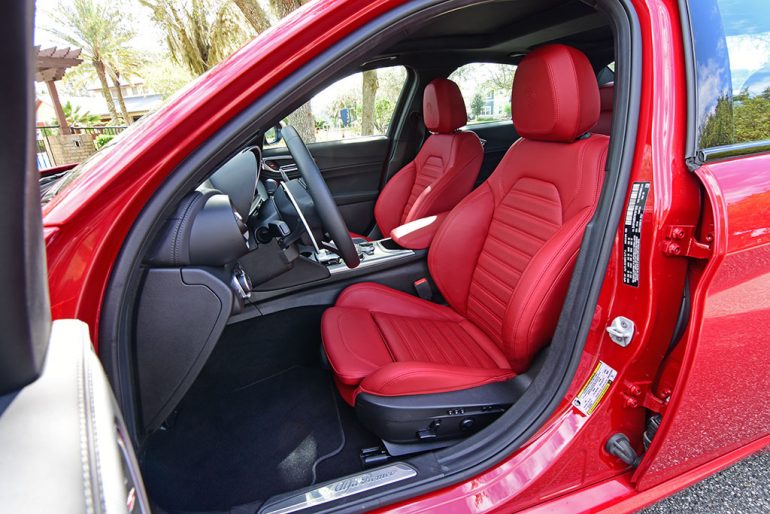
Cargo room in the trunk is generous at 13.4 cubic feet, and you add more room by folding down the 60/40-split rear seatbacks. However, you may find that you’re dropping items into the trunk instead of placing them in directly from the back due to the ‘interesting’ way the trunk lid opens.
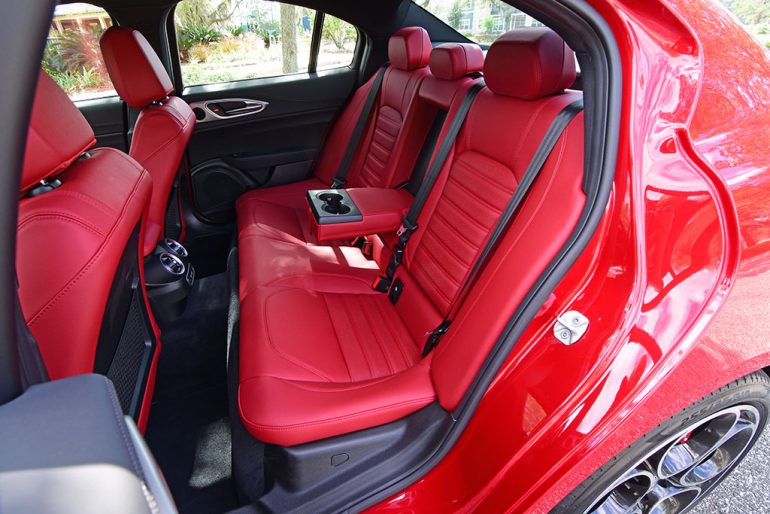
The Alfa Romeo Giulia bundles up many typical active safety features across the full trim range, which includes adaptive cruise control with full-stop ability, lane departure warning, blind-spot monitor with rear cross-traffic warning, and front/rear parking sensors. The single-angle backup camera system is somewhat disappointing with its small imagery on the smallish infotainment screen with a low resolution.
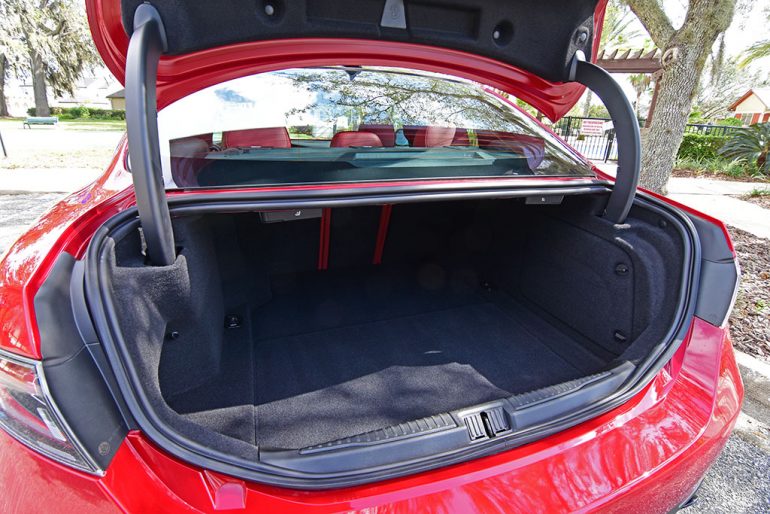
As a respected alternative to the entry-level luxury range for a compact sports sedan, the Giulia Veloce Q2 is a decent offering that gives buyers a unique sporty Italian flare that isn’t found in vehicles in this class at a price starting at $44,520. My mid-range trim Giulia Veloce Q2 test vehicle doesn’t necessarily break the bank as it comes to a price of $55,140, which includes a $1,595 destination charge. If you’re looking for something that’s a head-turner with decent performance without the sacrifice of fuel economy and your wallet, the Giulia deserves a close look.